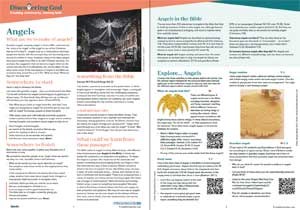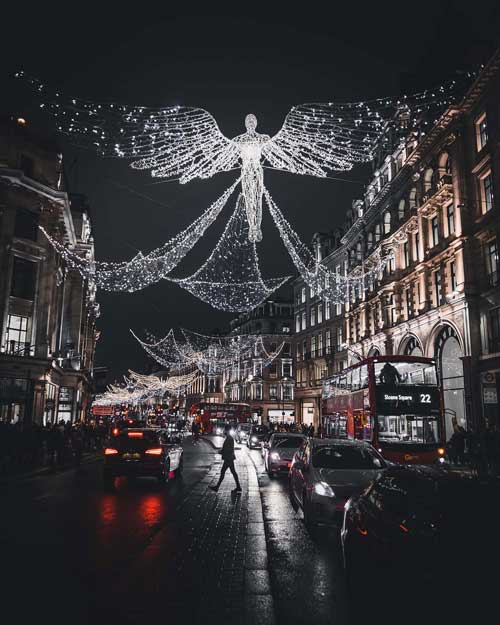 |
What are we to make of angels? |
Discovering God is a resource offering practical ideas for informal services and events. With a theme-based approach this series can help create community and a sense of belonging.
Guidance on using Discovering God can be found at: www.rootsontheweb.com/dg-intro

Click on the image to view a PDF.
Guardian angels, weeping angels in Doctor Who, someone has the ‘voice of an angel’, or the angel on top of the Christmas tree (or is it a fairy?) – angels crop up in many places and most people are familiar with the concept; they are fascinating and a source of comfort to many. However, many of the ideas people have about angels have little to do with Christian teaching. For example, the suggestion that we become angels when we die comes from the film It’s a Wonderful Life, not the Bible. On the other hand, some of the descriptions of angels in the Bible are so bizarre they sound like a sci-fi film. What are they? What are they for? Are they real?
Somewhere to start
Let’s start with guardian angels – they are mentioned in the Bible: ‘For he will command his angels concerning you to guard you in all your ways. On their hands they will bear you up, so that you will not dash your foot against a stone.’ (Psalm 91:11-12).
-
Ask: What do you think an angel looks like, and why? How might you recognise an angel? Do you think you’ve ever met with an angel? Encourage people to share thoughts.
-
Offer paper, pens and craft materials and invite people to create a picture of how they imagine an angel, and to continue sharing thoughts and questions about angels as they do so.
God of angels and archangels,
we marvel at the beauty around us that we see,
and at the mystery of what is unseen.
Draw close to us as we wonder and explore,
and discover more about your ways.
Amen.
Somewhere to finish
Before the end, come together to gather your thoughts and, if appropriate, to pray.
We sometimes describe people as an ‘angel’ when we want to say they are cute, beautiful, kind or well behaved.
-
What words would you now use to describe an angel?
Ask people to write these words on the angel pictures they
made earlier.
-
Invite everyone to reflect on the stories they have heard today, whether their views about angels have changed, or how people might encounter or recognise them.
Lord God, thank you that you care for us so much,
that you send angels to minister to us,
to encourage us and to guard and protect us.
The Bible tells us of angels constantly giving you honour and praise,
may we too praise and thank you.
Amen.

Follow-up ideas
- Write the words of Psalm 91:11-12 on a card and place it somewhere you will see it, remembering how God sends his angels to protect you.
- Listen to the song, Surrounded (Fight My Battles), based on the story of Elisha’s servant.
- Hebrews 13:2 says we should offer hospitality because we might be entertaining angels unaware. Can you offer hospitality to a stranger today? Buy someone a cup of coffee, share a snack or invite someone over for a meal.
Something from the Bible
Genesis 16:7-14 and 2 Kings 6:8-23
Two stories, a personal encounter and a grand vision, in which angels appear to strengthen and encourage. Hagar, a young girl of low social standing, learns that her challenging pregnancy is blessed and that God truly sees her. In a time of conflict and fearing defeat, Elisha’s servant can suddenly see God’s angelic armies surrounding the city, and the outcome is a victory without bloodshed.
A read and share idea
Create short dramas based on these two Bible stories. Then have someone pretend to be a reporter and interview the characters, asking questions such as:
- ‘As Elisha’s servant, how did seeing the angels change your perspective?’
- ‘Hagar, what went through you mind when you saw the angel?’
- To both: ‘Was it hard to believe?’
- To the Angel, ‘how did you feel about your role in the story?’
What could we learn from these passages?
The Bible refers to angels in many different ways, with different roles and purposes (see Angels in the Bible below). In these two stories the emphasis is on protection and guidance. To Hagar, the angel is a person who meets her at the waterside and speaks comforting and encouraging words; but Hagar is clear that what she has seen is God in person. Elisha’s servant is afraid in the face of superior forces; after Elisha prays, he sees a vision of God’s heavenly forces – horses and chariots of fire – and is comforted and encouraged.
There is an ambiguity here, a sense of mystery, as in many stories involving angels. Did Hagar see an angel or God in person? Were the forces surrounding Elisha’s army a vision or something more tangible? But what is clear is that those involved believe that God sent angels for their protection and guidance. We may not ever see an angelic presence, but we can be sure, based on the witness of those who have, and on God’s character and promises, that we are known and protected.
Angels in the Bible
The are more than 250 references to angels in the Bible that help to build up a picture of what or who angels are, although there is quite a lot of (deliberate?) ambiguity, and much is implied rather than explicitly stated.
What are angels like? Angels are described as spiritual beings created by God to serve and glorify him (Nehemiah 9:6, Hebrews 1:14). They were created before humans (Job 38: 4-7), and they do not die (Luke 20:35-36). Like humans they have free will, and can choose to serve God or rebel (Ezekiel 28; Isaiah 14).
What do angels do? Angels worship and serve God. For some that seems to be their main or only role (Isaiah 6). Others are assigned as warriors (Revelation 12:7-8) and guardians (Psalm 91:11), or as messengers (Genesis 16:7-14; Luke 1:11-38). Some have authority over certain regions (Daniel 8–12). But they are
not gods; the Bible tells us we should not worship angels (Colossians 2:18).
How many angels are there? They are described as ‘ten thousand upon ten thousand’ or ‘innumerable’ – so we don’t know, but there are a lot (Deuteronomy 33:2; Psalm 68:17; Hebrews 12:22; Revelation 5:11).
Do humans become angels after they die? No. Angels and humans are different created beings, and one does not become the other (Psalm 8:5).
Explore... Angels
Choose from these ideas to help people of all ages explore the theme together. Use the spiritual styles indicated by the coloured letters to help you plan, and cater for the different ways in which people connect with God.
What do angels look like? W

There are different types of angels mentioned in the Bible, including cherubim, seraphim, and ‘living creatures’, and they all look different. Some are described as having wings or looking like animals; others appear human - sometimes with bright shining faces (and no wings). In many biblical encounters, the angel says, ‘Do not be afraid’ – so their appearance must be awesome. Yet at other times, angels appear to be and are mistaken for humans.
-
Watch a Bible Project video on angels. And/or read these Bible passages: Genesis 3:24; Ezekiel 10:1-22; Psalm 18:10; Exodus 25:18-22; Isaiah 6:2–7; Ezekiel 1:5-14; Revelation 4:6-8.
-
Do any of the pictures you made earlier look like these angels?
Good news S E
One of the main roles of angels in the Bible is announcing and celebrating good news. Angels shout for joy at creation (Job 38: 4-7). Angels announce Jesus’ birth to the shepherds and then burst into song (Luke 2:13-14). Angels greet the women at the empty tomb to tell them that Jesus is risen (Matthew 28:1-7).
- Learn the cup-tapping rhythm at the start and play along with this celebration song.
- Has anyone in your group got good news to celebrate (an answered prayer, a good report, something they are thankful for)?
Angel cookies S A

Using angel-shaped cookie cutters (or perhaps animal shapes with added wings), make and/or decorate angel cookies. Give the cookies to people you know who need encouragement. You might want to include a card sharing a prayer.
Guardian angels W E A
27% of UK residents say they believe in God but, according to an Ipsos survey, 46% of Britain's adults say they believe in guardian angels, and three out of four of those people think that their guardian angel has protected them from danger.
-
Why do you think it’s easier for people to believe in angels than in God?
-
Can you think of times when you felt supernaturally protected (Psalm 91:11)?
-
Listen to the song ‘Angels Watching Over Me’, by Amy Grant.
-
Pray for people or situations you know about, where people need protection.
Spiritual styles (as defined by Dave Csinos) key:
Word, Emotion, Symbol, Action.
Find out more in Worship and learning support.